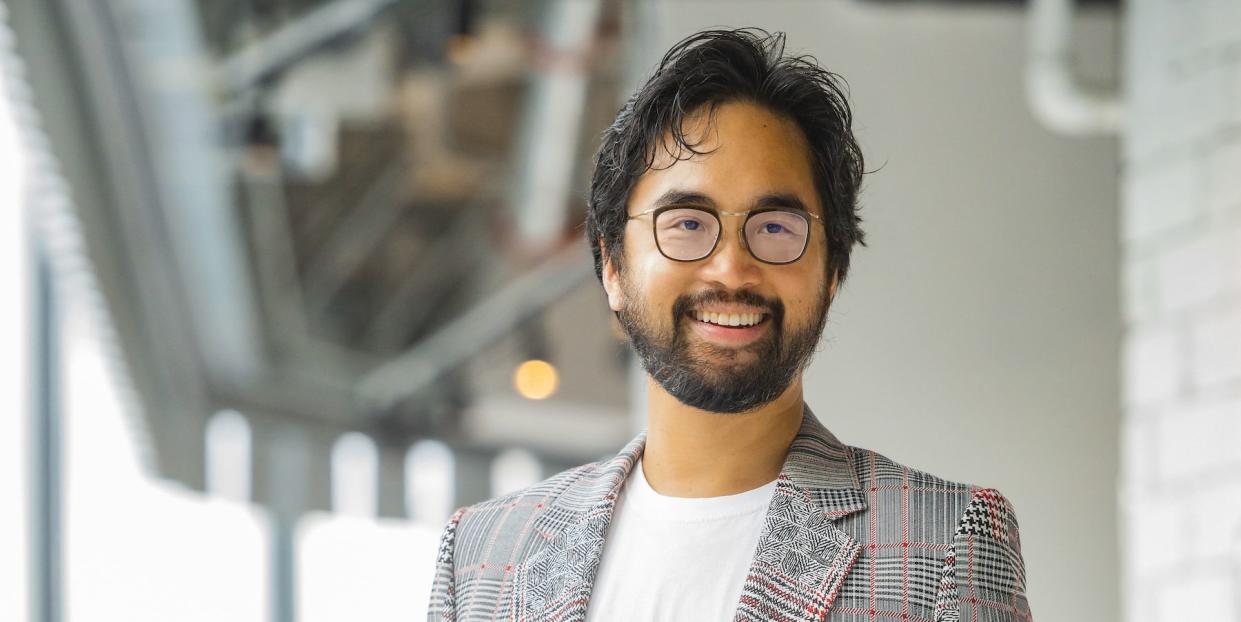How Adrian Cheng Pioneers a New Philanthropy for Hong Kong

- Oops!Something went wrong.Please try again later.
- Oops!Something went wrong.Please try again later.
- Oops!Something went wrong.Please try again later.
It’s an early August day, and Adrian Cheng is at home in Hong Kong, the city he was born and raised in. Cheng’s stay, however, is brief. Having just flown in from Seoul, where he also has a house, the 42-year old is set to leave for Singapore the next morning. It’s the kind of fast-paced life fitting for a billionaire entrepreneur with a network reaching across Asia and worldwide and a purview that extends from real estate development and retail to technology, culture, and philanthropy.
Cheng is confident, charismatic, and cosmopolitan—as comfortable in a board room among thought leaders as he is on a red carpet.
The third-generation scion of a Hong Kong real estate dynasty, the Cheng family ranks number three on this year’s Forbes Asia Hong Kong Rich List with a reported net worth of USD $26.6 billion. Cheng’s late grandfather Cheng Yu-tung laid the seeds for success when he opened the first Chow Tai Fook store in Hong Kong in 1946 and grew it into a global retail network; in 1970, he also launched New World Development, which grew into Hong Kong’s leading property development firm. Yu-Tung’s son Henry Cheng succeeded him as chairman of the family flagship firms Chow Tai Fook Jewellery and New World Development in 2012 and, in May 2020, he handed the reins to his oldest son, Adrian.
Today, the family’s most famed assets include the Rosewood Hotel Group run by Adrian’s sister Sonia Cheng (with such world-renowned luxury properties as the legendary Carlyle on Manhattan’s Upper East Side and the landmark Hôtel de Crillon in Paris in the portfolio) and K11 Group, founded by Adrian and billed as the world’s first cultural retail concept.
Cheng takes seriously the idea that such successes come with a responsibility to give back. Philanthropy is at the core of his ethos; the onset of the COVID-19 pandemic in late 2019 served to solidify his commitment to addressing issues including mental health, housing, sustainability, climate change, and the arts.
“We needed to help the community with our resources more,” Cheng says. “We are a big conglomerate; my family has many resources, and we saw the importance in creating social impact goals and making an impact by sharing our resources.”
Cue TWEMP Foundation –an acronym for well-being, EQ, mental health, and parenting – launched this August and puts children’s mental health front and center. Hong Kong has been especially hard-hit by COVID with some of the world’s strictest lockdowns and quarantine measures, which crystallized the urgency of this work.
“I launched the new initiative to focus on kids from ages three to eleven years old,” Cheng explains. “Asian culture doesn’t really give too much attention to the mental health of children. The kids lack the tools to express how they really feel, and parents aren’t able to give them the right positivity during this unprecedented time. Hong Kong’s educational and academic programs are also very rigorous, and children face a lot of pressure. We are providing tailor-made parenting programs, systems, products, and workshops to also support parents and teachers while raising public awareness of children's mental health.”
To date, the WEMP Foundation partnered with several local NGOS, as well as Cambridge University to conduct research, and Child Bereavement UK to provide children with protocols and processes to help process their grief in case of experiencing the loss of a loved one.
But WEMP is just one of several ways Cheng has played an instrumental role in helping his hometown get through this time.
He has also been spearheading the New World Bill for Good, a private program with the mission to help solve Hong Kong’s housing issues. Property prices are extremely high in this densely built metropolis, which makes it challenging— especially for young people with median incomes— to afford a starter home. Bill for Good is a non-profit social housing enterprise offering homes with an almost 50 percent discount on down payments to ease the burden of home ownership.
In addition, Cheng started Love Without Borders, using the family businesses’ construction resources to build a bacteria-free factory to make and provide free masks, and Share for Good, an online crowd donation platform conceived when the Omicron wave caused an extreme shortage of supplies. It allows corporations to donate goods help 10,000 underprivileged families.
“COVID changed people's thinking of what philanthropy really is,” says Cheng, noting how philanthropy was once considered no more than writing a check, but now, donors look for a deeper understanding and a real, tangible and positive impact.
“We’d go to all these fundraising galas, but is the money really going to change people's livelihood?” he says. “Do we know whether we’re going to really improve their lives? Do we trust the partners we collaborate with? How much is going to administrative fees? These are questions people are now asking. It's a revelation, a wake-up call for people to be able to say, ‘I know what's going with my money.’
“Giving people hope and dreams is important,” he continues. “But we also look at social impact, at finding solutions, and making serious change, scaling the change, and then maximizing problem-solving towards a better quality of life for all.”
Cheng also continues to expand his K11 MUSEA concept, which fuses commerce and culture in immersive environments.
“We saw a paradigm shift between older generations and millennials, who were born in the 1980s and craving something different,” Cheng says. “They don't want a purely transactional marketplace; they want something that’s about more than just material things, and we decided to combine creativity and culture into an immersive retail experience that merges art, culture, design, and creativity with commerce.” In other words, a museum experience inside a shopping mall with very high traffic.

“We are cross pollinating Eastern with Western artists, creating a bridge and platform to celebrate each other's cultures through art and creativity, while incubating emerging artists. This is what K11 embodies — a Silicon Valley culture to promote creativity.”
As for the future of Hong Kong in the wake of Covid, Cheng is bullish on its prospects.
“It has a unique position as an international business hub connecting the East and the West,” he says. “It's slowly recovering and regaining its vibrance. I feel confident about it, and I believe in continuing to invest in Hong Kong.”
This story will appear in the November 2022 issue of Town & Country. Subscribe Now
You Might Also Like

